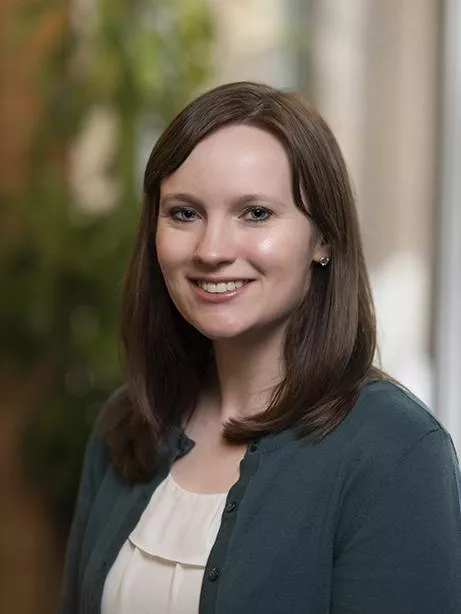
Sara Robinson is a Wildcat. She attended UNH as an undergraduate, worked with UNH Health Services and her grandmother served with the Nursing Department faculty. In 2022, Robinson graduated from the online UNH DNP program while serving as Program Director of the Post-Master’s Psychiatric Mental Health Nurse Practitioner Certificate UNH Online program. Knowing first-hand the competing demands of work, study and family life, she is excited to be an educator at UNH.
“I always wanted to be involved with a teaching program at UNH so to serve as the PMHNP Program Director is the realization of my dream. I love the diversity of students from all over the country but I am especially pleased to be part of training students in New Hampshire. We support all our students in the collective goal to improve mental healthcare and address the shortage of providers in their home states, including New Hampshire where the need is apparent.”
A Psychiatric Mental Health Nurse Practitioner, Robinson is fiercely committed to her career and speaks with energy about issues that impact people seeking care. Most patients find the current system bewildering; documentation, access points, and referral procedures were created for medical expediency, lacking the nuances inherently needed in psychiatric care. She knows that people in a vulnerable state need an advocate to navigate the maze of coverage and services, access to resources, and cut through extended wait times.
The problem of access and insurance coverage has been further exacerbated by the tsunami of variables spinning out of the pandemic – isolation, fear, job loss, grief – to an unprecedented degree. Robinson thinks it will take several years for all the psychiatric effects of the pandemic to be fully understood, not only for patients suffering from the crisis but also for providers struggling to balance their patients’ needs with their own situational difficulties.
According to Robinson, the human psyche composes many shades of grey that weave together a mix of genetics, medical history, social or family trauma, and external events. Added to this complex pattern is the duality of technology. On one hand, telehealth has filled gaps during a public health crisis while online access to a large pool of data and research is embedded in all aspects of society. On the other hand, the social distance inherent in online communication has created a new avenue of bullying, disrespect, and rhetoric which has led to increasing levels of depression, suicide, and intimidation.
The unevenness of contemporary psychiatric care struck a personal note when Sara experienced the treatment for a family member with advanced dementia. Poor provider collaboration meant that medications were contradictory, the family was not consulted during the patient assessment, and a poorly managed care plan aggravated an already stressful situation. But such experiences only solidify Robinson’s commitment to her path through education and good example, acting on her beliefs by joining the editorial board of the Psychiatric Times journal, the first Nurse Practitioner to participate in such a capacity.
“Mental health and medical health are two sides of the same coin. Pulling yourself up by the proverbial bootstraps does not work well, especially in the pressures of modern society. We need to encourage open conversation about emotional issues, teach our children good coping skills, and remove the stigma of mental health while increasing access to care and creating opportunities for well-trained professionals to provide much-needed services.”
A growing problem in mental health is addiction related to the use of opioids in pain management. Although pain clinics are scaling back the use of heavy pharmaceuticals, the resulting increase in pain experience has caused reactive issues such as substance abuse and increased depression resulting from poorly managed pain. Robinson mentions a few pain care providers who have recognized this trend and moved to substance abuse treatment to provide support for patients facing this dilemma, a small but noteworthy example of a shift in focus.
She strongly believes that the most important part of a provider’s job is to listen – quietly and without preconceptions. Despite pressures for time efficiency and documentation, patients expect nurse practitioners to assess their complex needs and priorities, meshing clinical knowledge with mental health needs and collaboratively advocating for resources.
“Assessment is the key. I teach students not to commit too early to a diagnosis and treatment plan because a patient’s problems may be complex and overlapping. It is a balancing act that requires instinct and practice to dissect the nuances and distinguish between medical and mental health needs. Listening well is among the most effective elements of patient care.”
Sara recalls a patient who was irritable, uncooperative, and unpopular. Looking beneath the jagged behavior she discovered a personal history of unfathomable trauma, leading to a perception of poor decisions and a lifetime of sadness and anger. Approaching this patient with an open mind and compassionate understanding helped him take the first step toward his own transformative journey. His response typifies the relief patients express when they can speak openly about their struggles with painful experiences: “You are the first person who has ever listened and made an effort to understand.”
Mindful of the emotional demands impacting mental healthcare providers, Sara teaches self-care to her students, encouraging them to gain perspective by talking with colleagues, creating a clear transition between work and home life, and pursuing activities that strengthen the body and replenish the soul.
Written by Gwendolyn Goguelet